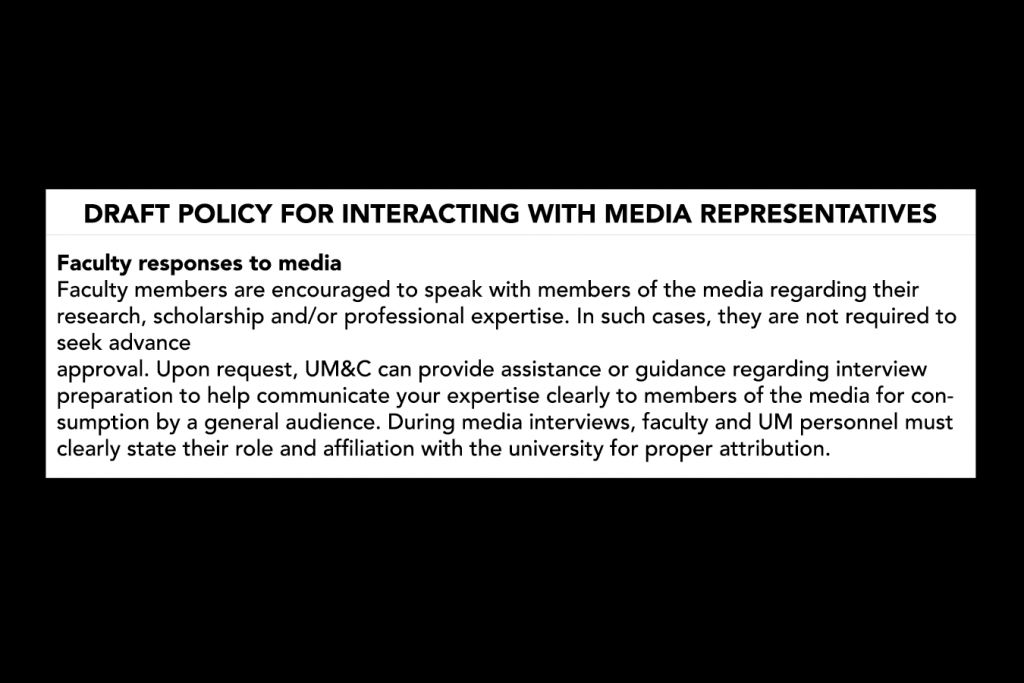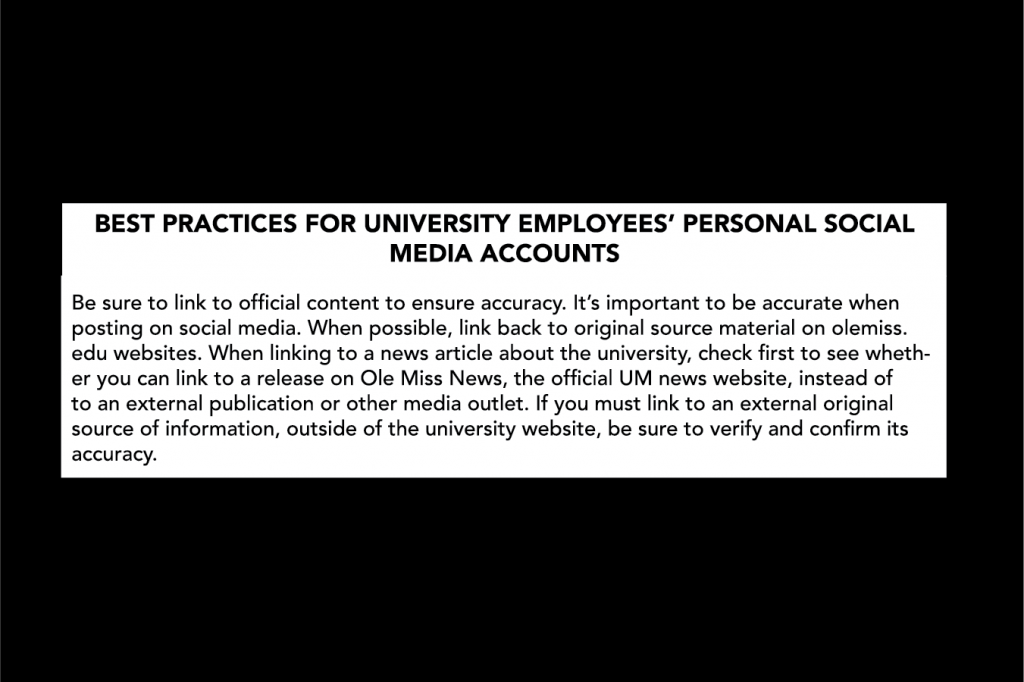A newly proposed university policy on faculty communications, if approved, would change how faculty and staff use social media and speak with media outlets. Faculty members are now expressing concern about how the new policy could limit free speech at UM.
The draft of the policy includes directions for when faculty members interact with the media and best practices for using official and private social media accounts.
The proposed policy from University Marketing and Communications (UM&C), 17 pages in total, would — among many other changes — allow faculty members to speak with members of the media without university approval about only research, scholarship, professional expertise or as private persons. Proposed best practices for personal social media accounts, which did not exist in the last version of UM’s media policy from 2015, include linking to university content when possible and following the UM Creed in online interactions.
“It’s hard to see how this is a practical solution to a problem,” Angela Green, a lecturer and chair of the governance committee on the faculty senate, said, adding that one faculty member described it as “a solution in search of a problem.”
After the proposed policy was discussed in the February faculty senate meeting, some faculty members went to senior administrators of the university to express concerns about the proposed policy reducing free speech for UM faculty. Concerned faculty, staff and students are set to meet with Jim Zook, chief marketing and communications officer, today at 2 p.m.
The faculty senate will review the draft of the policy at their March meeting on Tuesday.
The policy would not need the approval of the faculty senate or other governing bodies on campus, according to Zook. UM&C could adopt the policy after the approval from the policy manager, he said.
The policy manager is appointed by the chancellor “to review a proposed policy and provide advice regarding whether it supports the mission of the university and is consistent with other university policies and applicable law,” according to the university’s policy on policy management.
“Even if the faculty (senate) were to take a vote, it wouldn’t necessarily have any force,” Green said. “It would just be advising.”
One of the proposed policy’s goals is “to ensure consistent and aligned messaging” for the university. Zook said he wanted the campus to understand the services UM&C offered to faculty members, including “to help them understand what they’re being asked” by members of the media.
How the policy was formed
The proposed policy policy was created to update the current policy, a half page approved in 2015. The current policy states that UM&C “is responsible for conducting and/or coordinating all contact with media,” though Zook said that the policy does not reflect how UM&C operates now.
Zook said the policy has been in the works since the end of 2018. He said that the department looked to national higher education organizations to see if there was a model policy, but they did not find one. Then, they looked at other universities with publicly accessible policies and wrote a draft based on those universities — including the University of Georgia, the University of Buffalo, the University of Houston and Northeastern University — as models.
Zook said that they did not talk to other universities about how their media policies were adopted or the outcomes of the policies.
“We just looked at what they had on their websites,” Zook said.
Zook said there had been no discussion about how the university would react if one of the policies were broken.
“I would assume that it would be applied just like any other university policy would be,” he said. “I would think anything that’s a university policy would be applied, and employees would be expected to adhere to that.”
Zook said that UM&C sent the draft to a network of communicators around campus, the deans, the associate provost and the provost.
“Once we had a draft together, we’ve shot this around extensively,” he said.
Last month, UM&C shared the draft with the executive committee of the faculty senate, which added comments to the draft.
“We committed to come into this effort in a way designed to cultivate buy-in and broader understanding of our role at the university,” Zook said.
The proposed policy, which began being formed in 2018, caught many faculty members by surprise, according to Green, who said they did not know changes were being considered until the proposal was presented at the February faculty senate meeting.
Proposed policy on media interactions
“Faculty members are encouraged to speak with members of the media regarding their research, scholarship and/or professional expertise,” the current draft of the policy says. “In such cases, they are not required to seek advance approval.”
The original draft of the policy said that faculty members should only speak to the media without approval from UM&C when the interview is about “areas of subject matter expertise,” but the language was changed after the executive committee of the faculty senate voiced concerns about the subjectivity of the phrase.
“For me, (the original language) could be viewed as being restricted to Biology,” one member of the executive committee said in a comment approved by the entire committee. “But as a faculty member at this campus (regardless of my senate work), I would argue my experience on this campus over the past 12+ years provides some relative expertise on campus climate/community.”
When asked if a black professor could speak to a media outlet without UM&C approval about their experience of being a black professor at UM, Zook said that he would not speak to hypothetical situations.
“We didn’t put any hypotheticals or scenarios in here for this very reason — that it’s too easy for people to draw conclusions or assumptions, one way or another,” he said. “All we’re trying to do here, again, is to clarify to the campus community, what’s our role, who speaks on behalf of the university, how we are here to provide support and service for them and areas where we don’t play.”
Though faculty members are not required to seek advance approval for interviews discussing their areas of expertise in the proposed policy, they would not be allowed to send information to media outlets (except for academic journals or niche publications) without going through UM&C.
The proposed policy also states that faculty members “are encouraged to notify deans, department chairs/heads and UM&C when discussions with a member of the media have occured.”
Zook said that the word “encouraged” was chosen over “mandated” or “required” but would not say whether the policy was prescriptive.
“I’m not going to judge,” he said. “We’re trying to let the policy stand on its own.”
While on university property, journalists should be accompanied by a UM&C staff member or someone designated by UM&C, according to the draft. Faculty members “should” notify UM&C if they learn of media coming to campus, according to the proposed policy.
Faculty members may not make official statements for the university without coordinating with UM&C in the draft policy.
The draft of the policy also says that colleges, departments and schools should send articles, stories and blogs to UM&C for prior review, though it would not be required.
Without working with UM&C in the past for media training, faculty members are told in the proposed policy to decline interviews.
Best practices for individual social media accounts
Within the proposal, there are two sections on social media: best practices and policies.
Under the draft social media policy, rules are laid out for the use of official UM accounts, though there is a section addressing other accounts.
“When using social media as a part of their official duties, and/or when presenting oneself in social media settings as a university representative, all faculty and staff should conduct themselves in a way that is befitting of the institution,” the policy says.
The best practices for personal accounts lay out seven guidelines, including directives to link to UM&C content when possible, identify views as those of the owner of the account and uphold the UM creed in online interactions.
______________
The proposed policy could create a new social media and media outlet policy for all university faculty in the coming months.
“We’re trying to provide more clarity for folks at across campus to understand what we’re here to do, and in working with them in a collaborative way to update a policy that, again, is overly broad and vague,” Zook said.
Green said that she believed if the proposed policy were in place today, many faculty members would be in violation of it.
“My sense is that, yes, people are more reluctant than ever to speak to the media,” Green said. “The general feeling I have is that (the proposed policy) would have a pretty chilling effect.”
The faculty senate will review the proposed policy in their March meeting on Tuesday. Follow live coverage at thedmonline.com.
Proposed policy drafts:



















